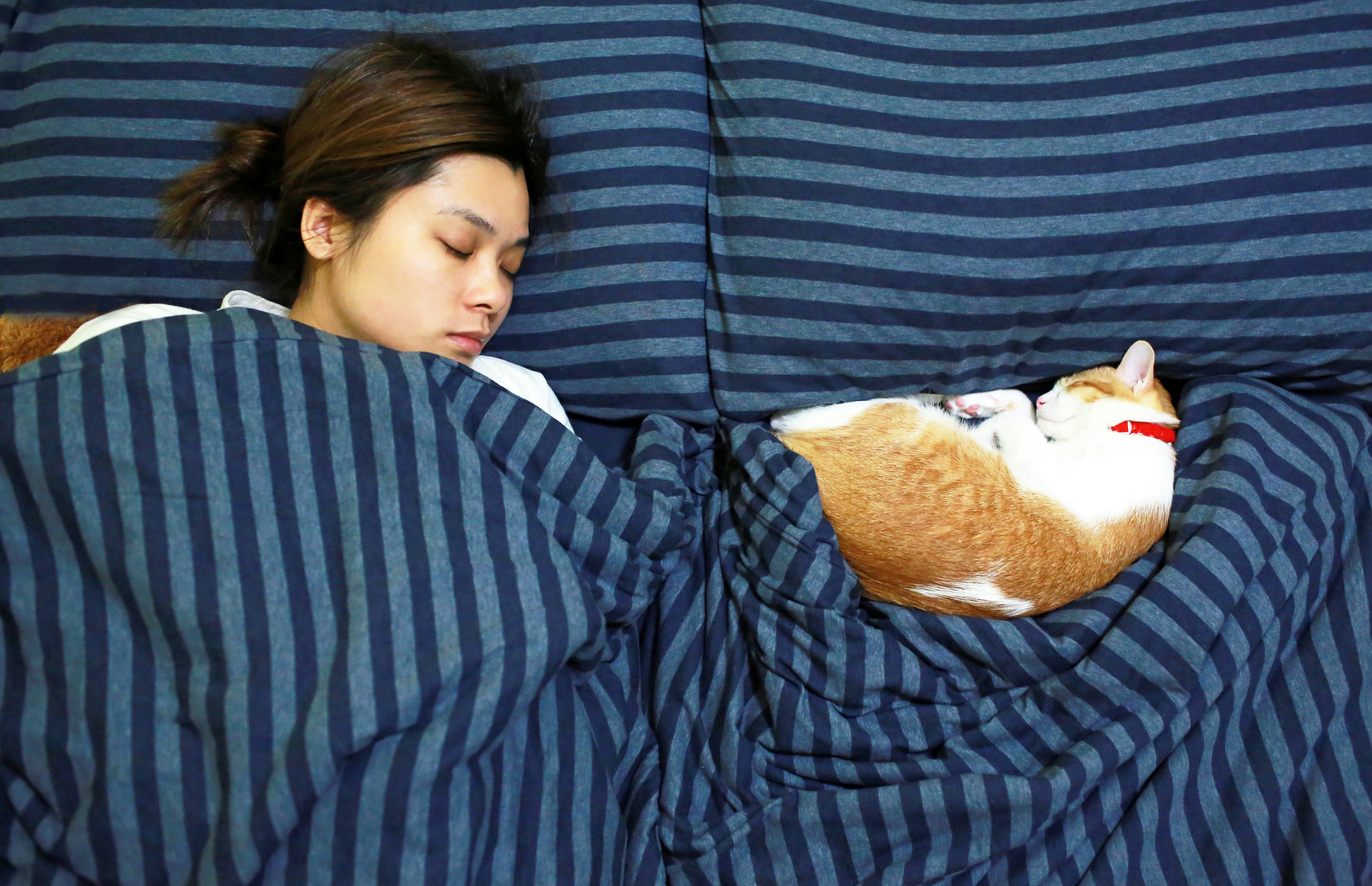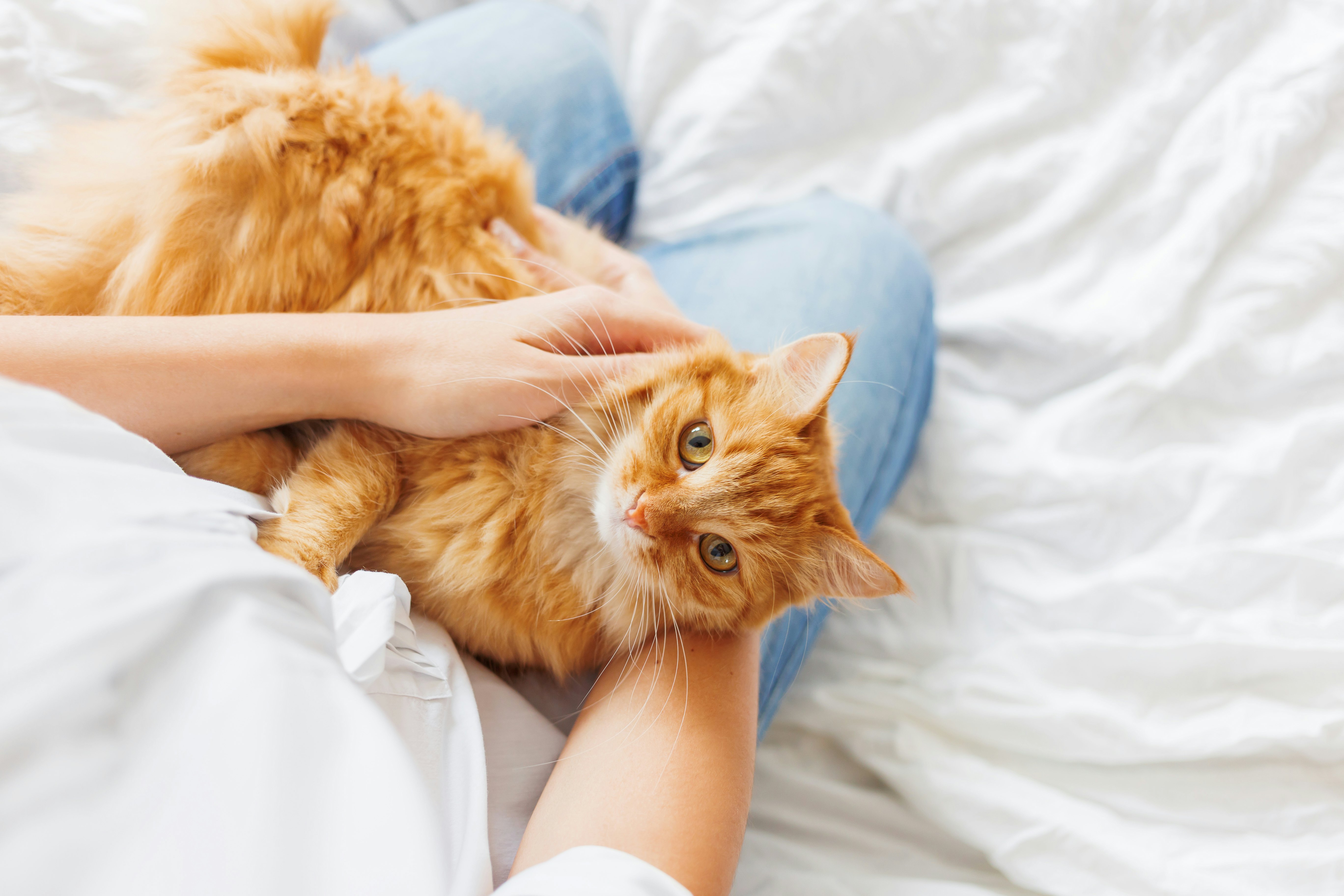
Despite their aloof reputation, many cats often like spending time in the company of their human owners — perhaps even too much time. As people continue to spend more of their waking hours at home during the pandemic, for some pet owners, that might be difficult to do with a fluffy creature perched on your head or mewling for your affection.
Is there a way to set healthy boundaries between yourself and your pet? Inverse reached out to our trusty feline experts to answer the question and explain why your cat might be so clingy.
“A cat who has plenty of exercise, enrichment, and attention will have healthy boundaries,” Mikel Delgado, a cat expert at Feline Minds, tells Inverse.
How do I get my cat to leave me alone at night?

Cats are not nocturnal animals, but their energy levels rise and wane throughout the day, and they can get the zoomies, leading them to skitter about when humans would normally be asleep.
Cats may wake up or even want to play with their humans, but we need our beauty sleep, too.
All the experts we interviewed were in agreement: Keep your cat engaged with activities throughout the daytime so they don’t wake you up at night. These activities could include food puzzles, climbing structures, and problem-solving.
By engaging your cat’s energy during the daytime, you both can hopefully get on the same sleep schedule at night, according to Delgado.
Some cats may still naturally be more awake during the night, and if that’s the case, continue to provide them with independent nighttime activities for them to focus on.
“For cats that remain active overnight, try to meet their needs more overnight such as providing special safe cat toys or food puzzles or other cat safe activities for them to enjoy overnight,” Katherine Pankratz, a board-certified veterinary behaviorist, tells Inverse.
If your pet tends to wake you up early for mealtime, Pankratz recommends using an automatic feeder or providing food puzzles so your cat eats smaller meals throughout the day.
Some experts suggest that closing the bedroom is a good option, but others advise against it since your cat may spend several nights mewling and scratching at their door as they adjust to the new arrangement.
“This won't solve the problem long term, and could be stressful for the cat,” Emma Grigg, a certified animal behaviorist and lecturer at the University of California, Davis, School of Veterinary Medicine, tells Inverse.
If you’re going to close the bedroom door, Pankratz says to make sure you provide “enriching items” like toys, food, and a comfortable sleeping spot to keep your cat occupied and feeling secure as it adjusts to this nightly separation.
It’s important to note: If your cat is unusually active at night, it’s best to consult a veterinarian.
“This is particularly important in senior cats, as increased nocturnal vocalization, sleep/wake cycle disruptions, etc. can be a sign of cognitive dysfunction,” Grigg explains.
Your veterinarian may recommend increasing the amount of playtime with your cat right after work and right before you go to bed “to allow the cat to get out excess energy and tire her out for a calm evening,” according to Grigg. Intensive 15-minute playtime sessions are fine. Some veterinary behaviorists also recommend feeding the cat after this play session.
How can I work from home with a cat?

It’s natural for your cat to occasionally traipse across your laptop while you’re working from home, but if your cat is purring during your entire workday, then that’s a problem.
Pankratz suggests “setting your cat up to succeed” by providing them with clear expectations of your workday routine and providing for their mental needs.
“If your cat is used to snuggling with you when you work on your computer, your cat likely does not understand why it is okay to do so at some times and is unacceptable at other times,” Pankratz says.
You can avoid confusing your cat and teach them to play independently — in a separate room, ideally — through solo activities like food puzzles or a rotation of different toys. Before important phone or Zoom calls, Pankratz will rattle a treat jar to get her cat, Kaeto, to follow her into a separate room, where he will get extra treats for complying.
“I also place one of my cat's favorite comfy beds on my desk, not far from my computer — he tends to say hello briefly and then go sit in his bed nearby,” Grigg says.
Delgado also recommends providing cats structured playtime before and after your work hours so they won’t seek your attention while you’re busy. Additionally, you can provide them with a perch near a window for bird-watching to distract them during the workday. Planting bird-and-bee-friendly plants or hanging a bird feeder outside your window can also help.
But your cat might be bugging you while you’re on an important work call because they expect you to reward them for pushy behavior. For example, if you only provide your cat attention when it’s begging for it — such as when it’s scratching at your desk chair — then the cat will learn that it has to be demanding to get your attention.
Grigg adds that you can avoid these incorrect expectations by providing regular attention in other situations when you’re not busy working and the cat is behaving calmly.
But at the end of the day, if you are working remotely from home, try to remember that this additional time with your canine companion can be a reward in itself — so long as you set appropriate expectations for your pet.
“The stay-at-home orders associated with the pandemic meant that many cat owners were spending much more time with their cat than they had perhaps anticipated, but remember these are companion animals: the whole reason we have them is for companionship,” Grigg says.
Is my cat being clingy for a specific reason?

“Some cats are just needier. This can be [due to] personality or upbringing,” Delgado says.
While people may have brought a cat into their home based on the expectation that they’re low-maintenance, experts stress it’s important to realize that your cat has its own needs as an individual. Some cats are very affectionate by nature — and require ample affection in return.
But there’s a difference between a cat that is generally needy and a cat that is experiencing separation anxiety.
“Cats can experience separation anxiety but by definition, these are behaviors that happen in the owner's absence, so it can be hard to diagnose,” Delgado says.
Grigg adds that separation anxiety tends to be less common in cats than dogs, but it does occur. There isn’t as much research on separation anxiety in cats compared to dogs, though a 2002 study does explain some clinical symptoms in felines.
There’s also a difference between separation anxiety and “hyperattachment.” A cat that is very clingy may not be experiencing separation anxiety, but again, further research is needed in this area.
“Hyperattachment — staying in close proximity or in physical contact with the attachment figure — has not been thoroughly explored in cats,” Pankratz says.
If you’re worried your cat may be experiencing separation anxiety, consider a webcam or video recording device to monitor your pet’s behavior while you’re away from home. If your cat is showing certain signs of distress, consult a veterinarian about the appropriate next steps, which may include a referral to a veterinary behaviorist. These signs may include:
- Meowing
- Overgrooming
- Self-mutilating
- Urination or defecation
- Destructive behavior
Can I set healthy boundaries with my cat?

It’s definitely possible to set boundaries with your pet. Grigg offers three general guidelines to establish a healthy relationship between owner and cat.
First, make sure to provide your cat with attention and interactive playtime occasionally throughout the day.
Second, ensure your cat has all the resources — such as toys, food, and a comfortable sleeping spot — it needs.
Finally, avoid reinforcing “'pushy' or 'demanding' behavior” by providing food or attention only when the cat misbehaves. Instead, reward your pet with attention when the pushy behavior stops.
“In general, think about how you can be as clear and predictable for your cat to avoid confusion and if you need something from your cat, make it worth their while without the need for force or threats,” Pankratz adds.
If your cat bugs you at night or while you’re working, do not resort to punishment — such as yelling or scolding. This will only instill fear in your pet. At the end of the day, human owners should remember that a relationship with a pet is similar to any companion, requiring affection and attention even amidst our busy schedules.
“You have to remember that your cat has a lot of restrictions on their life imposed by humans, and it is your responsibility to provide them with a fun, stimulating, and safe environment to thrive in,” Delgado says.







